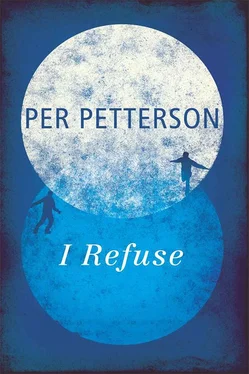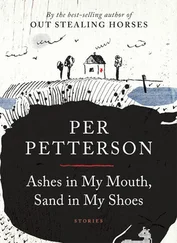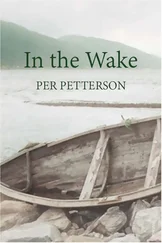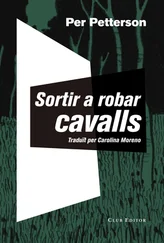‘Who does the house really belong to,’ he said. ‘Isn’t it our house,’ he said. ‘Did you get any money for it. Did I get any money for it. No, we didn’t. So I can do what I like with the house. If you don’t want to be part of it, that’s fine by me. We could have done it together. That would be the right thing. But if you don’t want to, I’ll do it on my own.’
‘But, Tommy, why do you have to burn it down. You don’t need to burn it down, do you.’
‘Yes, I do. Now that nothing’s like it was before, the damn house shouldn’t be like it was, either. It’s not right. I didn’t get it until I looked through the window. Goddamnit, Siri, I can’t sleep at night,’ he said, and now he wasn’t formal at all.
‘But, Tommy, I’ve got to go to handball training.’
‘Handball training.’ He looked down at my bag. He hadn’t noticed it until now. ‘Do you have to go to handball training,’ he said.
‘Yes, I do .’ Past Tommy’s shoulder I could see the über-Christian neighbour’s car turning in to the crossroads, and I didn’t know if he had given up on me or was looking for me. He might well have been, because he slowed down and for a moment the car stopped altogether, and then I started to run with the bag in my hand, I waved to the neighbour, and he saw me and waved back. A huge vehicle passed me on its way into the petrol station, a removal van it was, and it stopped with a hiss of brakes, and I glanced back as I ran, but by then Tommy was lost behind the van.
TOMMY ⋅ JONSEN ⋅ AUGUST 2006
I WALKED INTO the Central Hospital through the door facing the car park, past the reception and the kiosk and past the café towards the staircase. One floor lower was the Bunker, where Jim was admitted in 1971, that was more than thirty years ago, and we were so young then, it’s easy to forget that everything looks different when you are young, it looks better, there is so much time, and then suddenly everything is worse, much worse, the whole world blown sky high from one day to the next. This time I was going up to the third floor, and before I always ran up the stairs, but now I took the lift. I drank too much.That was why.
On the third floor I passed the duty room, and then I walked three doors down the corridor and into the room where Jonsen was. I had known him all my life. The doctor was standing at his bedside, they were talking, but I couldn’t hear what they were saying. Then Jonsen turned his head on the pillow and saw me come in. He smiled, and the doctor turned and saw me and took one step back, one to the side, he had seen me before, the day we arrived at the hospital in a helicopter, when Jonsen had collapsed in front of me in his living room, but I hadn’t been there since, I had been away, in Haugesund, it wasn’t good, but that’s the way it was. I said hello, and the doctor said hello.
‘Hi,’ I said. ‘How’s it going.’
‘Not so good, my friend,’ Jonsen said.
‘I had to go to Haugesund,’ I said. ‘It was quite important. I’m sorry,’ I said.
‘That’s all right,’ he said. He was still smiling, but the skin under his eyes was blue, almost black. I had a book with me, by John Steinbeck, I thought maybe he hadn’t read. Jim gave it to me one time when we were boys, it said to me from him on the title page. I found it in a box at home when I was going through the basement. I put it on the bedside table. Jonsen stretched his hand over and he slowly turned the book round with his index finger and said:
‘I haven’t read this one.’ He looked surprised, he was sure he had read all of Steinbeck’s books, but he hadn’t.
‘The plot takes place in Norway,’ I said. ‘During the war.’
He looked up at me. ‘You’re having me on.’
‘I’m not having you on,’ I said.
‘Well, I’ll be damned,’ he said, and the doctor coughed quietly behind my back, or maybe he was laughing. There are all kinds of doctors.
‘It’s not bad,’ I said, but I had no idea whether it was good or bad. I had simply read it. It was a long time ago. I couldn’t remember the last time I read a novel.
‘I hope there is time to read it,’ he said.
‘You’ll have plenty,’ I said.
‘That’s not so sure, my friend.’
That was the second time he had said that, my friend. He never said that before. He just said Tommy. He looked me in the eye a little too firmly. I turned. The doctor was chewing his bottom lip, holding his hands tightly behind his back and studying the floor. He slowly shook his head. I turned back.
‘What’s that supposed to mean.’
‘I haven’t got long left, my friend.’
Goddamnit, stop saying my friend, I thought. I can’t take it.
‘Hell, surely you’ve got time to read a book,’ I said, and that was a pathetic thing to say, for what has a book got to do with anything when someone is dying. When Jonsen is dying.
‘Are you going to die,’ I said.
‘Yes,’ he said, and I said:
‘Yes, but I mean now , are you going to die now ,’ I said.
‘He’s given me two or three weeks,’ Jonsen said, nodding to the doctor who was still standing there, half behind me. I had already forgotten him, he was certainly a discreet doctor. ‘There’s nothing they can do, he says,’ Jonsen said.
‘Of course there is something they can do,’ I said. ‘This is 2006 not 1706.’
‘It’s too late now,’ Jonsen said. He was exhausted, his voice had no energy, no air in it.
I looked around. My legs felt suddenly tired. On the other side of the bed, by the window, there was a chair. I walked round alongside the window, picked up the chair and placed it next to the bed on the opposite side to where I had come in. I sat down, but then the doctor wasn’t behind me any more, but in front of me. I should have carried the chair all the way round, I thought, but it was too late now, and it would look rude if I moved the chair a second time and sat with my back to him. It would be rude, too. But he could go, couldn’t he, the doctor, and leave me alone with Jonsen.
‘So what’s in your thoughts now,’ I said.
He didn’t answer, what would he be thinking. What would I have been thinking if it was me.
‘I hold life dearly,’ he said. ‘I don’t feel like it’s over.’ He was seventy-five. I was fifty-four. Almost. ‘You could refuse, of course,’ he said, trying to laugh, but it turned into a cough. ‘But this is it,’ he said. ‘It’s all right. It doesn’t matter.’ He turned his head on the pillow, towards the window, away from me.
I didn’t agree. It wasn’t all right. It did matter.
‘Of course you can refuse,’ I said.
He looked at me again. ‘You can’t refuse to die, my friend.’
‘Goddamnit, of course you can refuse,’ I said.
Two Sundays later he was laid to rest behind the old church in Mørk. It was a simple and pretty church, painted white outside and inside. Only the altar and the seats had any colour, they were farmhouse red and blue. There weren’t many people there. The priest was a woman. He wouldn’t have minded. He had always liked women, most men did, of course, but he really liked women, he liked being with them, talking to them, he thought they were more intelligent by far than men. At least the men he knew. He’d had a good relationship with my mother as well, in the time before she left us one evening just before Christmas, when the snowdrifts by the road stood as tall as a man and just getting in and out of the house was a grind. They often talked.
‘It wasn’t her fault,’ he had said three Sundays before. We were standing in his living room, I still had the purple coat on with a suit underneath, it was his birthday. I had driven all the way out for the occasion and had put on my leather gloves and a scarf around my neck, but he had only a flannel shirt on. He had forgotten his own birthday, he looked surprised when I wished him many happy returns, and it was still morning and as long as I stayed on my feet he did too, even though he looked in a bad way.
Читать дальше












